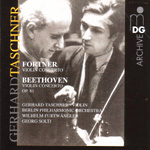Gerhard Taschner premiered Wolfgang Fortner’s (1907-87) Violin Concerto in 1947. Composed very much in the style of the times, it makes liberal use of neoclassicism and expressionism and offers occasional hints of jazz. Sounding variously like Stravinsky, Berg, Bartók, and even Barber, the work makes a good impression, though not one that lingers long after the performance is over. Fortner’s solo writing is technically challenging, which Taschner takes to with a discernible relish, skillfully negotiating the driving rhythms, double-stops, and wide harmonic leaps. Furtwängler manages to keep the Berlin Philharmonic mostly on its toes, and the 1949 recording is surprisingly clear and full-sounding.
Taschner’s brisk and boldly phrased Beethoven matches Georg Solti’s lean, muscular conducting style, resulting in a viscerally compelling performance. The more familiar contours of the Beethoven allow for a greater appreciation of Taschner’s rich tone and acute musical imagination, particularly in the spirited first movement, which features a powerfully rendered cadenza. This 1952 performance also was recorded in exceptionally fine sound for the period. In sum, an interesting disc, and one whose appeal is not strictly limited to historical buffs.
































